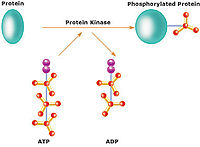
Photo from wikipedia
Glioblastoma (GBM) is the most common malignant primary brain tumor, with poor survival despite treatment with surgery, radiotherapy, and chemotherapy with temozolomide. Little progress has been made over the last… Click to show full abstract
Glioblastoma (GBM) is the most common malignant primary brain tumor, with poor survival despite treatment with surgery, radiotherapy, and chemotherapy with temozolomide. Little progress has been made over the last two decades, and there remain unmet medical needs. Approximately 45% of patients with GBM carry EGFR mutations, and 13% of them possess altered PDGFR genes. Moreover, VEGF/VEGFR mutations are also observed in the patient population. Tyrosine kinase inhibitors (TKIs) are emerging cancer therapy drugs that inhibit signal transduction cascades affecting cell proliferation, migration, and angiogenesis. Indications for small molecule TKIs have been successfully expanded to multiple types of cancer; however, none of the TKIs have been approved for patients with GBM. In this review, we summarize clinical trials of small molecule TKIs in patients with GBM and plausible hypotheses for negative clinical study results. We also discuss the potential TKI candidates that presented significant preclinical outcomes in patients with GBM.
Journal Title: Archives of Pharmacal Research
Year Published: 2020
Link to full text (if available)
Share on Social Media: Sign Up to like & get
recommendations!